六年级英语下册知识点总结
- 格式:doc
- 大小:36.50 KB
- 文档页数:6
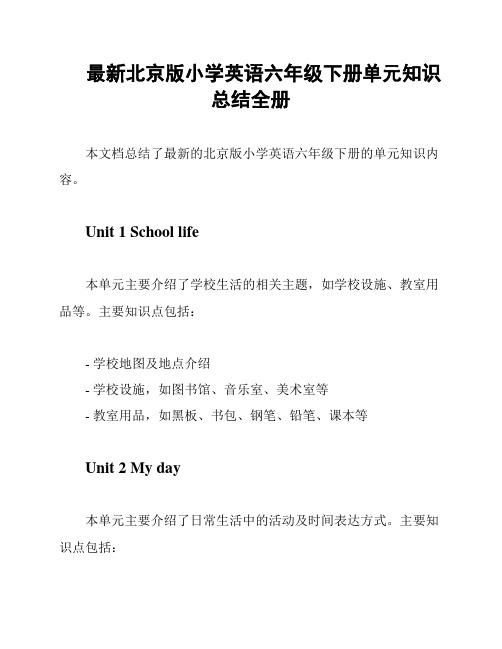
最新北京版小学英语六年级下册单元知识总结全册本文档总结了最新的北京版小学英语六年级下册的单元知识内容。
Unit 1 School life本单元主要介绍了学校生活的相关主题,如学校设施、教室用品等。
主要知识点包括:- 学校地图及地点介绍- 学校设施,如图书馆、音乐室、美术室等- 教室用品,如黑板、书包、钢笔、铅笔、课本等Unit 2 My day本单元主要介绍了日常生活中的活动及时间表达方式。
主要知识点包括:- 日常起居活动,如起床、刷牙、吃早餐等- 时间表达方式,如数字时间、时间段等- 一天不同时间的活动安排Unit 3 My family本单元主要介绍了家庭生活的相关主题,如家庭成员、家庭环境等。
主要知识点包括:- 家庭成员及称呼- 家庭环境,如家具、颜色等- 家庭活动,如吃饭、看电视等Unit 4 My city本单元主要介绍了城市生活的相关主题,如城市交通、地标建筑等。
主要知识点包括:- 城市交通工具及用途- 城市地标建筑介绍- 城市的基本特征介绍Unit 5 Food and drink本单元主要介绍了食品和饮料的相关主题,如饮食惯、食品种类等。
主要知识点包括:- 饮食惯及健康饮食知识- 食品和饮料种类介绍- 点餐和付款的相关表达方式Unit 6 Our world本单元主要介绍了地理和自然环境的相关主题,如世界各地、动物和植物等。
主要知识点包括:- 世界各地及地理位置介绍- 动物和植物种类介绍- 简单的地理和自然环境常识以上是六年级下册的各单元知识点的简要介绍,希望本文档能够帮助您更好地掌握小学英语知识。
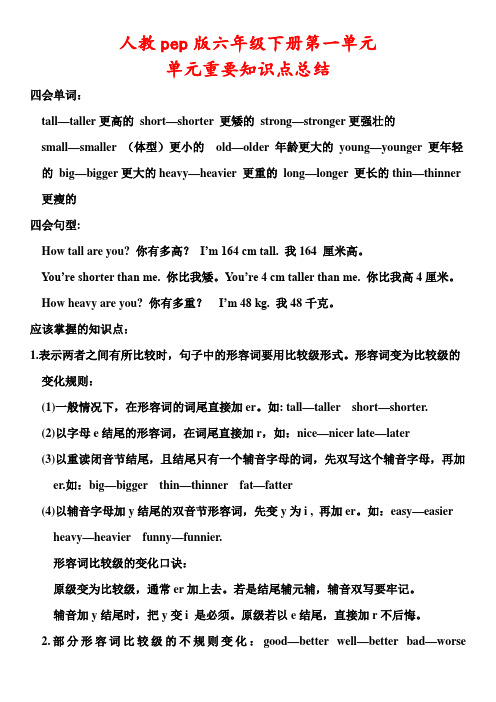
人教pep版六年级下册第一单元单元重要知识点总结四会单词:tall—taller更高的short—shorter 更矮的strong—stronger更强壮的small—smaller (体型)更小的old—older 年龄更大的young—younger 更年轻的big—bigger更大的heavy—heavier 更重的long—longer 更长的thin—thinner 更瘦的四会句型:How tall are you? 你有多高?I’m 164 cm tall. 我164 厘米高。
You’re shorter than me. 你比我矮。
You’re 4 cm taller than me.你比我高4厘米。
How heavy are you? 你有多重?I’m 48 kg. 我48千克。
应该掌握的知识点:1.表示两者之间有所比较时,句子中的形容词要用比较级形式。
形容词变为比较级的变化规则:(1)一般情况下,在形容词的词尾直接加er。
如: tall—taller short—shorter.(2)以字母e结尾的形容词,在词尾直接加r,如:nice—nicer late—later(3)以重读闭音节结尾,且结尾只有一个辅音字母的词,先双写这个辅音字母,再加er.如:big—bigger thin—thinner fat—fatter(4)以辅音字母加y结尾的双音节形容词,先变y为i , 再加er。
如:easy—easierheavy—heavier funny—funnier.形容词比较级的变化口诀:原级变为比较级,通常er加上去。
若是结尾辅元辅,辅音双写要牢记。
辅音加y结尾时,把y变i 是必须。
原级若以e结尾,直接加r不后悔。
2.部分形容词比较级的不规则变化:good—better well—better bad—worsebadly—worse many—more much—more little—less far—farther3.同义句:How tall are you?=What’s your height?How heavy are you?=What’s your weight?4.以How开头的问句(仅限小学阶段):How are you? 问身体状况。
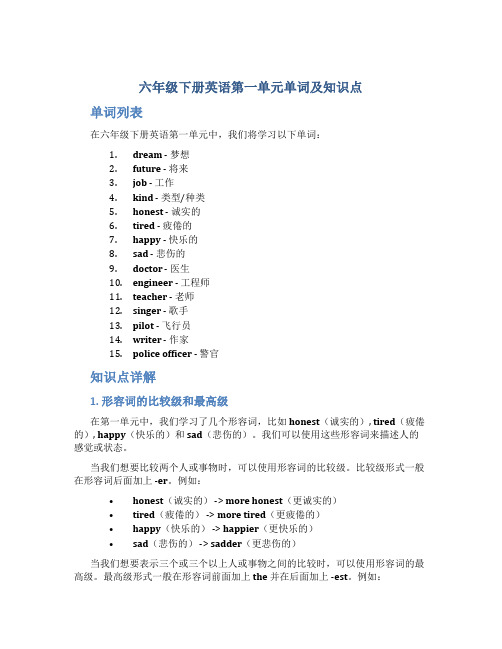
六年级下册英语第一单元单词及知识点单词列表在六年级下册英语第一单元中,我们将学习以下单词:1.dream - 梦想2.future - 将来3.job - 工作4.kind - 类型/种类5.honest - 诚实的6.tired - 疲倦的7.happy - 快乐的8.sad - 悲伤的9.doctor - 医生10.engineer - 工程师11.teacher - 老师12.singer - 歌手13.pilot - 飞行员14.writer - 作家15.police officer - 警官知识点详解1. 形容词的比较级和最高级在第一单元中,我们学习了几个形容词,比如honest(诚实的), tired(疲倦的), happy(快乐的)和sad(悲伤的)。
我们可以使用这些形容词来描述人的感觉或状态。
当我们想要比较两个人或事物时,可以使用形容词的比较级。
比较级形式一般在形容词后面加上-er。
例如:•honest(诚实的) -> more honest(更诚实的)•tired(疲倦的) -> more tired(更疲倦的)•happy(快乐的) -> happier(更快乐的)•sad(悲伤的) -> sadder(更悲伤的)当我们想要表示三个或三个以上人或事物之间的比较时,可以使用形容词的最高级。
最高级形式一般在形容词前面加上the并在后面加上-est。
例如:•honest(诚实的) -> the most honest(最诚实的)•tired(疲倦的) -> the most tired(最疲倦的)•happy(快乐的) -> the happiest(最快乐的)•sad(悲伤的) -> the saddest(最悲伤的)2. 职业名词在第一单元中,我们学习了一些常见的职业名词。
人们在不同的职业中担任不同的角色,从而为社会做出贡献。
以下是一些常见的职业名词:•doctor(医生): 医生负责照顾病人的健康,并给予他们医学建议和治疗。
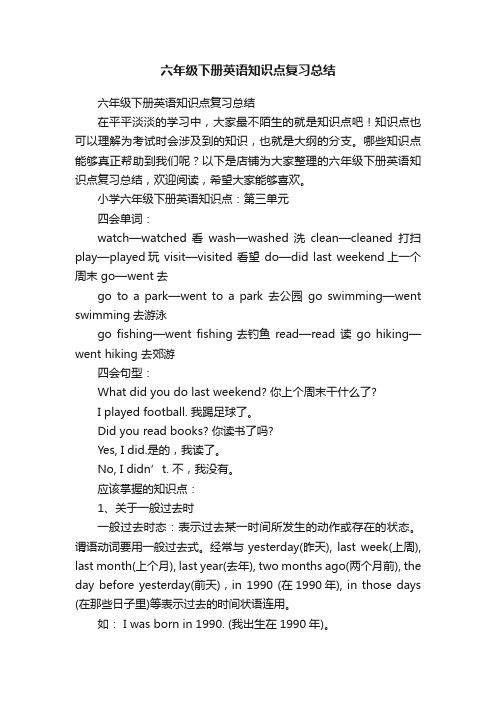
六年级下册英语知识点复习总结六年级下册英语知识点复习总结在平平淡淡的学习中,大家最不陌生的就是知识点吧!知识点也可以理解为考试时会涉及到的知识,也就是大纲的分支。
哪些知识点能够真正帮助到我们呢?以下是店铺为大家整理的六年级下册英语知识点复习总结,欢迎阅读,希望大家能够喜欢。
小学六年级下册英语知识点:第三单元四会单词:watch—watched 看wash—washed 洗clean—cleaned打扫play—played玩 visit—visited 看望do—did last weekend上一个周末 go—went去go to a park—went to a park 去公园go swimming—went swimming去游泳go fishing—went fishing去钓鱼read—read 读go hiking—went hiking 去郊游四会句型:What did you do last weekend? 你上个周末干什么了?I played football. 我踢足球了。
Did you read books? 你读书了吗?Yes, I did.是的,我读了。
No, I didn’t. 不,我没有。
应该掌握的知识点:1、关于一般过去时一般过去时态:表示过去某一时间所发生的动作或存在的状态。
谓语动词要用一般过去式。
经常与yesterday(昨天), last week(上周), last month(上个月), last year(去年), two months ago(两个月前), the day before yesterday(前天),in 1990 (在1990年), in those days (在那些日子里)等表示过去的时间状语连用。
如: I was born in 1990. (我出生在1990年)。
When did you go to the park? (你是什么时候去的公园)。

六年级下册英语外研版知识点
以下就是小编给大家整理的完六年级下册英语外研版知识点,仅供参考。
一、词汇:
hot dog热狗、cashier收银员、cola可乐、soup汤、dollar美元、cent美分、enjoy享用,享受、meal餐。
二、句子:
1.I want a hamburger.我想要一个汉堡。
2.What do you want?你想要什么?
3.I want a hot dog.我想要一个热狗。
4.Can I have some soup?我可以要一些粥吗?
5.How much is it?多少钱?
6.It’s thirteen dollars and twentyfive cents.
一共是13美元,25美分。
7.Here’s your food.这是你的食物。
8.What do you want to eat?你想吃什么?
9.I want to eat some meat.我想吃些肉。
以上就是小编给大家整理的外研版六年级下册英语的知识点。
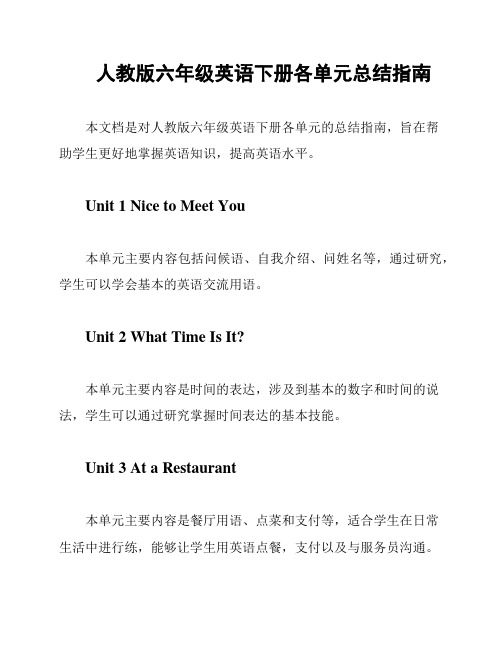
人教版六年级英语下册各单元总结指南本文档是对人教版六年级英语下册各单元的总结指南,旨在帮助学生更好地掌握英语知识,提高英语水平。
Unit 1 Nice to Meet You本单元主要内容包括问候语、自我介绍、问姓名等,通过研究,学生可以学会基本的英语交流用语。
Unit 2 What Time Is It?本单元主要内容是时间的表达,涉及到基本的数字和时间的说法,学生可以通过研究掌握时间表达的基本技能。
Unit 3 At a Restaurant本单元主要内容是餐厅用语、点菜和支付等,适合学生在日常生活中进行练,能够让学生用英语点餐,支付以及与服务员沟通。
Unit 4 My Day本单元主要内容是时间的表达和描述日常活动,通过研究掌握日常活动用语。
Unit 5 Our School本单元主要内容是学校场景用语及学校建筑的描述,学生可以通过研究掌握基本的学校用语。
Unit 6 My Family本单元主要内容是家庭成员的介绍、职业和工作地点等,通过研究掌握家庭成员的英语表达。
Unit 7 At the Zoo本单元主要内容是关于动物的英语表达,学生可以通过研究掌握动物名称的英语表达。
Unit 8 At the Park本单元主要内容是关于公园的英语表达,学生可以通过研究掌握公园场景用语。
Unit 9 Our City本单元主要内容是关于城市的英语表达,学生可以通过研究掌握城市的基本用语以及描述城市的特点。
Unit 10 Happy Holidays本单元主要内容是关于节假日的英语表达,学生可以通过研究掌握节假日的英语表达。
总的来说,本书包含了学生日常生活所需的各个方面的英语表达,希望学生能够在学习英语的过程中更好地掌握英语知识。

(完整版)六年级下册英语知识点总结六年级下册英语知识点总结第一单元(Unit1 How tall are you?)单词:tall—taller更高的short—shorter 更矮的strong—strong更强壮的old—older年龄更大的young—younger 更年轻的big—bigger更大的heavy—heavier 更重的long—longer 更长的thin—thinne更瘦的small—smaller 更小的dinosaur恐龙hall大厅metre,meter 米than比both 两个都kilogram千克,公斤countryside乡村low—lower更低的shadow阴影,影子smart—smarter更聪明的become开始变得,变成句子:1、That's the tallest dinosaur in this hall.那是这个厅里最高的恐龙。
2、You’re older than me. 你比我大。
3、How tall are you ?你有多高?I’m 1.65 metres.我身高1.65米。
4、What size are your shoes ?你穿多大号的鞋?5、My shoes are size 37. 我穿37号的鞋。
6 、Your feet are bigger than mine .你的脚比我的大。
7、How heavy are you ?你有多重?I’m 48 kilograms .我体重48公斤。
8、It’s taller than both of us togethe r .它比我们俩加在一起还高。
应该掌握的知识点:1、形容词变为比较级的变化规则:(1)一般情况下,在形容词的词尾直接加er。
如: tall—taller short—shorter.(2)以字母e结尾的形容词,在词尾直接加r,如:nice—nicer. late—later(3)以重读闭音节结尾,且结尾只有一个辅音字母的词,先双写这个辅音字母,再加er.如:big—bigger thin—thinner fat—fatter(4)以辅音字母加y结尾的双音节形容词,先变y为i , 再加er。
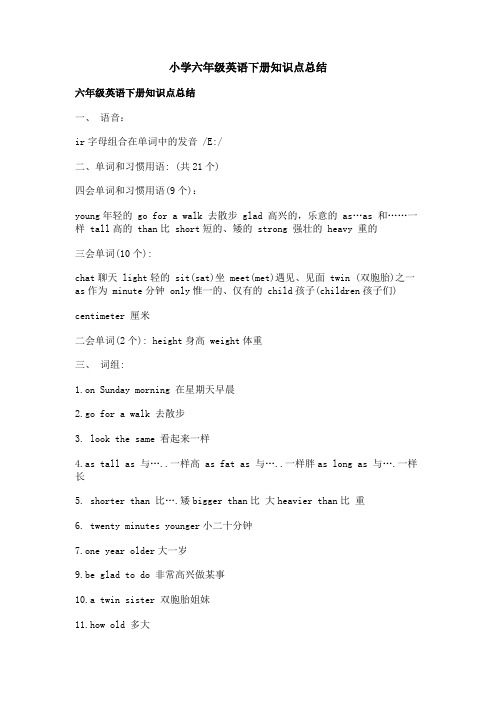
小学六年级英语下册知识点总结六年级英语下册知识点总结一、语音:ir字母组合在单词中的发音 /E:/二、单词和习惯用语: (共21个)四会单词和习惯用语(9个):young年轻的 go for a walk 去散步 glad 高兴的,乐意的as…as 和……一样 tall高的 than比 short短的、矮的 strong 强壮的 heavy 重的三会单词(10个):chat聊天 light轻的 sit(sat)坐 meet(met)遇见、见面 twin (双胞胎)之一as作为 minute分钟 only惟一的、仅有的 child孩子(children孩子们)centimeter 厘米二会单词(2个): height身高 weight体重三、词组:1.on Sunday morning 在星期天早晨2.go for a walk 去散步3. look the same 看起来一样4.as tall as 与…..一样高 as fat as 与…..一样胖as long as 与….一样长5. shorter than 比….矮bigger than比大heavier than比重6. twenty minutes younger小二十分钟7.one year older大一岁9.be glad to do 非常高兴做某事10.a twin sister 双胞胎姐妹11.how old 多大12.the only child 仅有的一个孩子13.a tall boy 一个高个子的男孩14.a young teacher 一位年轻的教师15.some heavy boxes 一些重的盒子16.your old friend(s)你的老朋友17.a strong goalkeeper 一个强壮的守门员18.the girl in red 穿红衣服的女孩19.yours or mine 你的还是我的20.look young 看起来年轻21.have a chat 聊天、闲谈四、形容词比较级:A.直接加er/rtall---________light----________young--_________old---________strong--___ small--_________late---_________long---_________short--________ nice--- _____B.双写加erbig-------_________ fat-----_________ thin---________ hot---________C.去y改i加erheavy---_________ early---__________ busy---__________D不规则good---_______ many---________ much---______ bad/ill ---_____little---_______五、句型:1、A+谓语(be动词)+形容词比较级+than +B A比B……Who’s younger than him ? 谁比他年轻?My brother is younger than him . 我弟弟比他年轻。

六年级下英语知识点总结(优秀)六年级下册英语知识点复习总结篇一①playbadminton打羽毛球②alwaysdoyourhomework总是做家庭作业③drythedishesaftersupper晚饭后擦干盘子④atthesportsstore在运动品专卖店⑤makelunch做午饭⑥lastweek上周⑦before/afterbreakfast⑧onceayear一年一次⑨wakeup起床动词原形及过去式buy----bought(买)teach----taught(教)think----thought(想)win-----won(赢)do----did(做)lose----lost(丢失)throw----threw(扔)swim----swam(游泳)have----had(有)lie-------lay(躺)say------said(说)forget-----forgot(忘记)begin------bagin(开始)bring-----brought(带来)eat----ate(吃)go-----went(去)isam-----wasare-----were六年级英语知识点大总结篇二六年级英语知识点大总结Unit1 How can I get there?key words(重点单词)museum 博物馆 postoffice 邮局bookstore 书店 cinema 电影院hospital 医院 restaurant 餐馆crossing 十字路口 turn left/ right 左转go straight 笔直走 map 地图next to 与。
相邻 near在。
附近key sentence patterns (重点句型)1. Where is the cinema? 电影院在哪?2. It’s next to the bookstore.它紧邻书店。
3. How can I get there? 我怎样到那儿?4. Turn left at the bookstore. 在书店左转。
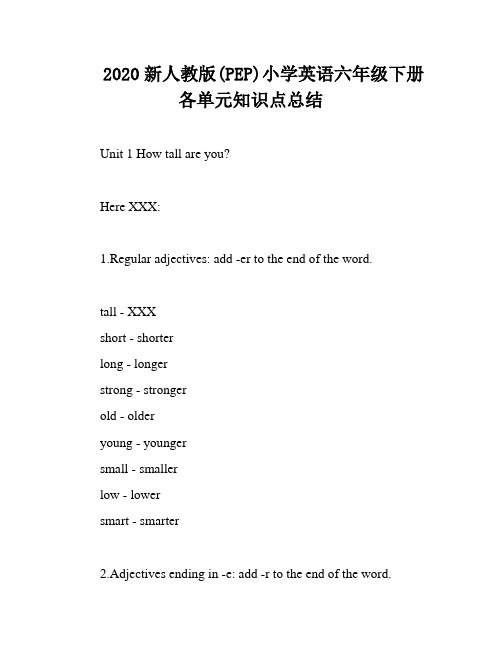
2020新人教版(PEP)小学英语六年级下册各单元知识点总结Unit 1 How tall are you?Here XXX:1.Regular adjectives: add -er to the end of the word.tall - XXXshort - shorterlong - longerstrong - strongerold - olderyoung - youngersmall - smallerlow - lowersmart - smarter2.Adjectives ending in -e: add -r to the end of the word.large - largerlate - latersimple - simplersafe - safer3.Adjectives XXX: double the final consonant and add -er.big - biggerXXX - XXXfat - fattersad - sadderhot - hotterwet - wetter4.Adjectives ending in -y: change the -y to -i and add -er.happy - happierheavy - XXXXXX - funnierangry - angrierXXX - XXXwindy - windierbusy - busierearly - earlierXXX:dinosaur。
hall。
than。
both。
meter。
kilogram。
size。
feet。
wear。
countryside。
shadow。
e.Here XXX:1.Asking about age。
height。
weight。
etc.How old are you?How tall are you?How heavy are you?I am (age) years old。
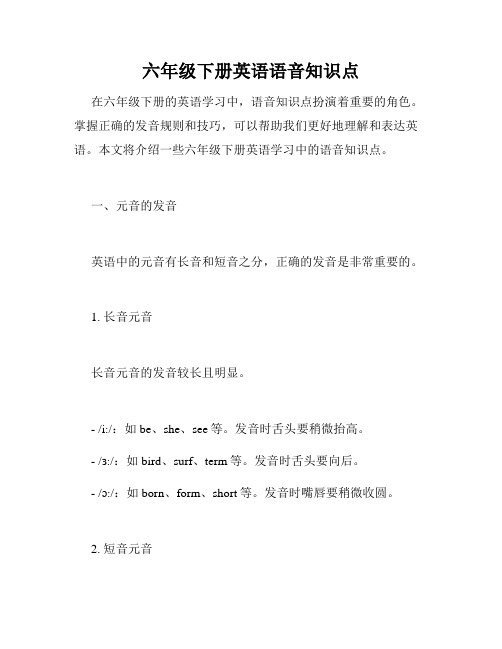
六年级下册英语语音知识点在六年级下册的英语学习中,语音知识点扮演着重要的角色。
掌握正确的发音规则和技巧,可以帮助我们更好地理解和表达英语。
本文将介绍一些六年级下册英语学习中的语音知识点。
一、元音的发音英语中的元音有长音和短音之分,正确的发音是非常重要的。
1. 长音元音长音元音的发音较长且明显。
- /i:/:如be、she、see等。
发音时舌头要稍微抬高。
- /ɜ:/:如bird、surf、term等。
发音时舌头要向后。
- /ɔ:/:如born、form、short等。
发音时嘴唇要稍微收圆。
2. 短音元音短音元音的发音较短且清晰。
- /i/:如bit、sit、hit等。
发音时不要将舌头抬得太高。
- /e/:如get、pet、bed等。
发音时嘴唇要稍微张开。
- /æ/:如cat、hat、man等。
发音时嘴唇要突出向前。
二、辅音的发音英语中的辅音有浊音和清音之分,不同的发音方式会影响词意的理解。
1. 浊音辅音浊音辅音的声带会震动。
- /b/:如big、job、club等。
发音时双唇要闭合。
- /d/:如dog、bed、sad等。
发音时舌头要接触上颚。
- /g/:如go、bag、egg等。
发音时舌头要接触软腭。
2. 清音辅音清音辅音的声带不会震动。
- /p/:如pig、pat、top等。
发音时双唇要闭合,然后迅速分开。
- /t/:如top、sit、hat等。
发音时舌尖要接触上颚。
- /k/:如cat、cake、black等。
发音时舌头要接触软腭。
三、重读音节的规则在英语单词中,通常只有一个音节是重读的。
1. 单词结尾是辅音字母+y的情况当单词结尾是辅音字母+y时,重读音节在y之前。
例如:study(读音:/ˈstʌdi/)、fly(读音:/flaɪ/)2. 双写末尾辅音字母的情况当单词末尾是辅音字母时,且前面只有一个元音字母,重读音节在辅音字母之前。
例如:better(读音:/ˈbetər/)、hotel(读音:/hoʊˈtel/)四、音标的运用学习标准的国际音标可以更准确地指导我们的发音。
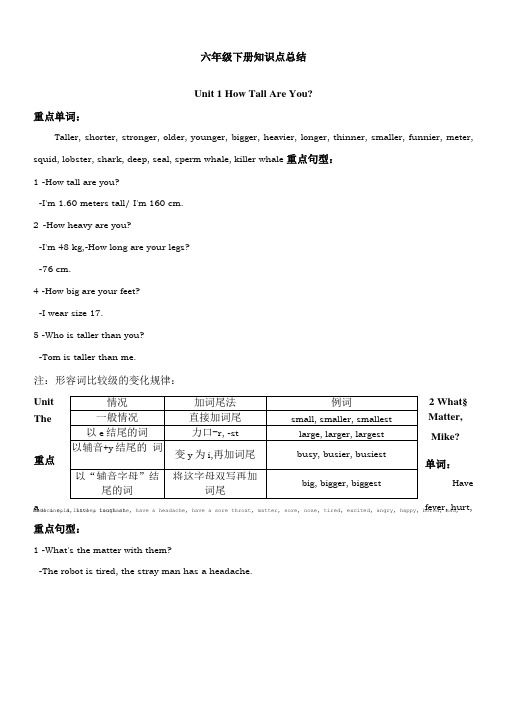
六年级下册知识点总结Unit 1 How Tall Are You?重点单词:Taller, shorter, stronger, older, younger, bigger, heavier, longer, thinner, smaller, funnier, meter, squid, lobster, shark, deep, seal, sperm whale, killer whale 重点句型:1-How tall are you?-I'm 1.60 meters tall/ I'm 160 cm.2-How heavy are you?-I'm 48 kg,-How long are your legs?-76 cm.4 -How big are your feet?-I wear size 17.5 -Who is taller than you?-Tom is taller than me.注:形容词比较级的变化规律:Unit2 What§The Matter,Mike?单词:重点Havea fever, hurt, have a cold, have a toothache, have a headache, have a sore throat, matter, sore, nose, tired, excited, angry, happy, bored, sad, medicine, a little, laugh at重点句型:1 -What's the matter with them?-The robot is tired, the stray man has a headache.-Fine. How are you?-I have a headache / fever / cold / toothache / sore throat.或have the flu.3 -What's the matter, mike?-I feel sick. I have a fever./ My throat is sore, my nose is hurt.4-How does Lisa feel?-She is tired/ sad/happy/excited.5-How are you, Liu Yun? You look sad.-I failed the math test.6-How do you / them feel? /How does he/she feel?-They feel happy./He/She feels happy.Unit 3 Last Weekend重点单词:Watch, wash, clean, play, visit, do, last, weekend, go, to, park, go to swimming, go hiking, go fishing, tongue twister, yesterday, return 重点句型:1-What did you do last weekend/yesterday?-I watched TV / washed the clothes/cleaned the room/played the football/visited grandparents/ played football/went to a park/went swimming/read a book/went fishing/went hiking/-Did you do homework yesterday?-Yes, I did./ No, I didn't.2-What did you do last weekend?-I V-ed……注:动词过去时的变化形式:1、一般情况下,动词词尾加-ed ,如:work ---worked play-played wanted--wanted act --- acted2、以不发音的-e结尾动词,动词词尾加-d,如:live-lived move——moved taste-tasted hope -hoped3、以辅音字母+y结尾的动词,把-y变为-i再加-ed,如:study-studied copy-copied cry-cried carry-carried4、以一个辅音字母结尾的重读闭音节动词,双写词尾辅音字母,再加-ed,如:stop —stopped5、不规则动词的过去式变化规律性不强,须多加记忆。

一. 知识点归纳(一)、 词汇乘坐) (脚)火车(怎样) 飞机(上轮船) ( 地铁) ( 交通工具前加 , 表示乘坐但步行要用 )第五 记住 找到不同 相同的 每个 所有的三会 国家 意思是 驾驶右边的 边 英国 澳大利亚 但是 左边的 如果 必须(二)、重点句型① 询问交通方式用疑问代词⏹ —— ? 你怎样去上学?—— . 我走路去上学。
⏹ —— ? 你怎么去加拿大。
—— . 我坐飞机去。
⏹ —— ? 你父亲怎样去上班?—— . 他坐地铁去上班。
② 询问地点,用疑问代词⏹ —— ? 你家在哪里?—— ’ . 在邮局旁边。
⏹ —— ? 教师们在哪儿?—— ’ . 在教师的办公室。
③ 问路⏹ —— ? 我怎么去中山公园?—— .④ 交通规则( )⏹ ⏹ . 黄灯停 ⏹ . 绿灯行在中国与美国,司机靠右行驶。
但是在英国与澳大利亚,司机靠左边行驶。
词 汇图书馆 (北) 邮局医院: 电影院(地点) 书店 (东) (西)科学博物馆银行学校(南)超市鞋店在哪里请与…相邻右边,正确的左边成直线地然后转弯对不起想要双分钟告诉乘坐远放学以后上车下车第十二聚会;晚会开始买句型一、问路. , ? 请问电影院在哪儿?. 在医院的旁边。
. 在学校的前面.在公园的后面’ . 在动物园的附近.. 在书店的左右边.. 在银行的东边.. 离这儿很远.. , 请问这附近有电影院吗?, . 有.. ? 我该怎样到达医院呢?二、指引路. . 你可乘坐路公交车去那儿.. …在…地方上车下车.. . 向前直走在分钟.. …在…地方向右左转.朝东西南北走…分钟.三 ? 离这儿远吗?一.知识点归纳(一)、词汇四会下周报纸今天上午漫画书今天下午杂志(时间 ) 今天晚上字典今夜明信片明天去旅游主题公园买一些水果宠物店(活动)去看电影(其他)水果摊参观长城鞋店阅读有关植物的杂志商店三会:忙碌的一起地需要其他二、重点句式与句型:本单元中出现的一个重点语法项目是一般将来时:表示将要发生的动作或状态,常与表示将来的时间连用。
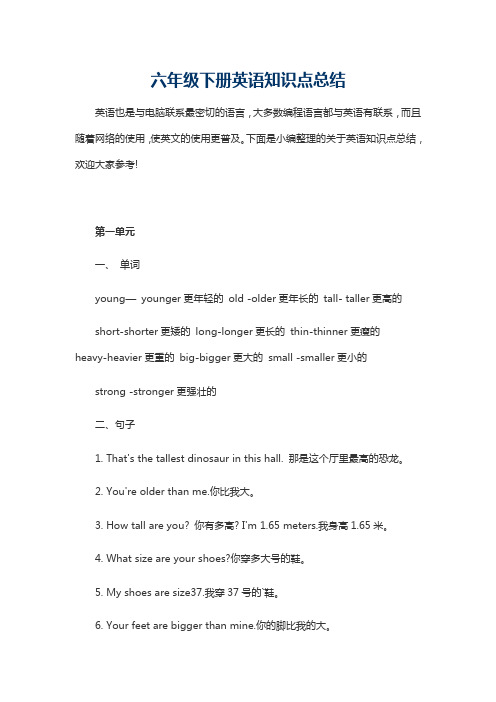
六年级下册英语知识点总结英语也是与电脑联系最密切的语言,大多数编程语言都与英语有联系,而且随着网络的使用,使英文的使用更普及。
下面是小编整理的关于英语知识点总结,欢迎大家参考!第一单元一、单词young—younger更年轻的old -older更年长的tall- taller更高的short-shorter更矮的long-longer更长的thin-thinner更瘦的heavy-heavier更重的big-bigger更大的small -smaller更小的strong -stronger更强壮的二、句子1. That's the tallest dinosaur in this hall. 那是这个厅里最高的恐龙。
2. You're older than me.你比我大。
3. How tall are you? 你有多高? I'm 1.65 meters.我身高1.65米。
4. What size are your shoes?你穿多大号的鞋。
5. My shoes are size37.我穿37号的`鞋。
6. Your feet are bigger than mine.你的脚比我的大。
7. How heavy are you?你有多重?8. I'm 48 kilograms.我体重48公斤。
三、语法复习要点形容词的比较级1、形容词比较级在句子中的运用:两个事物或人的比较用比较级,比较级后面一般带有单词than。
than后的人称代词用主格(口语中可用宾格)。
2.形容词加er的规则:⑴一般在词尾加er ;⑵以字母e 结尾,加r ;nice---nicer⑶以一个元音字母和一个辅音字母结尾,应双写末尾的辅音字母,再加er ;big--- bigger thin---- thinner⑷以“辅音字母+y”结尾,先把y变i,再加er 。
heavy----heavier3.不规则形容词比较级:good/well-better例句:(1).It's taller than both of us together.它比我俩加起来还高。
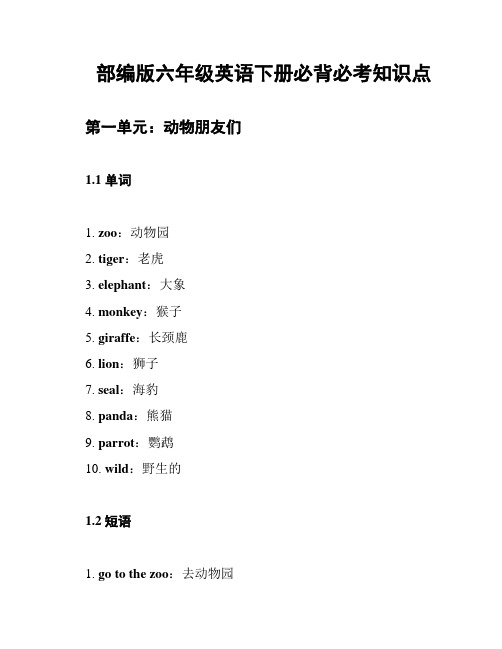
部编版六年级英语下册必背必考知识点第一单元:动物朋友们1.1 单词1. zoo:动物园2. tiger:老虎3. elephant:大象4. monkey:猴子5. giraffe:长颈鹿6. lion:狮子7. seal:海豹8. panda:熊猫9. parrot:鹦鹉10. wild:野生的1.2 短语1. go to the zoo:去动物园2. a tall animal:一个高大的动物3. the biggest animal:最大的动物4. a small monkey:一个小猴子5. in the tree:在树上1.3 句型1. What's this?:这是什么?2. What's that?:那是什么?3. It's ...:它是...4. Do you like ...?:你喜欢...吗?5. Yes, I do./No, I don't.:是的,我喜欢./不,我不喜欢。
第二单元:我们的身体2.1 单词1. body:身体2. head:头3. eye:眼睛4. ear:耳朵5. nose:鼻子6. mouth:嘴7. arm:手臂8. hand:手9. leg:腿10. foot:脚2.2 短语1. head and shoulders:头和肩膀2. eyes and ears:眼睛和耳朵3. nose and mouth:鼻子和嘴4. arms and legs:手臂和腿2.3 句型1. I have ...:我有...2. He/She has ...:他/她有...3. Do you have ...?:你有...吗?4. Yes, I do./No, I don't.:是的,我有./不,我没有。
第三单元:颜色和形状3.1 单词1. red:红色2. yellow:黄色3. blue:蓝色4. green:绿色5. black:黑色6. white:白色7. purple:紫色8. orange:橙色9. round:圆的10. square:平方的3.2 短语1. red and yellow:红色和黄色2. blue and green:蓝色和绿色3. black and white:黑色和白色4. purple and orange:紫色和橙色3.3 句型1. What color is it?:它是什么颜色?2. It's ...:它是...3. What shape is it?:它是什么形状?4. It's ...:它是...第四单元:食物和饮料4.1 单词1. apple:苹果2. banana:香蕉3. orange:橙子4. grape:葡萄5. watermelon:西瓜6. pear:梨7. rice:米饭8. noodles:面条9. meat:肉10. egg:鸡蛋4.2 短语1. eat fruit:吃水果2. drink milk:喝牛奶3. have a meal:吃一顿饭4.3 句型1. What do you like?:你喜欢什么?2. I like ...:我喜欢...3. What do you want?:你想要什么?4. I want ...:我想要...第五单元:家庭和朋友5.1 单词1. father:父亲2. mother:母亲3. brother:兄弟4. sister:姐妹5. grandfather:祖父6. grandmother:祖母7. friend:朋友5.2 短语1. my family:我的家人2. your family:你的家人3. his family:他的家人4. her family:她的家人5.3 句型1. Who's this?:这是谁?2. Who's that?:那是谁?3. It's ...:它是...4. Is it ...?:它是...吗?以上是部编版六年级英语下册必背必考知识点的详细内容,希望对大家有所帮助。
六年级下册知识点总结Unit 1 How Tall Are You重点单词:Taller, shorter, stronger, older, younger, bigger, heavier, longer, thinner, smaller, funnier, meter, squid, lobster, shark, deep, seal, sperm whale, killer whale重点句型:1 -How tall are you-I’m meters tall/ I’m 160 cm.2 -How heavy are you-I’m 48 kg,3 -How long are your legs-76 cm.4 -How big are your feet-I wear size 17.5 -Who is taller than you-Tom is taller than me.注:形容词比较级的变化规律:Unit 2 What’s The Matter, Mike重点单词:Have a fever, hurt, have a cold, have a toothache, have a headache, have a sore throat, matter, sore, nose, tired, excited, angry, happy, bored, sad, medicine, a little, laugh at重点句型:1 -What’s the matter with them-The robot is tired, the stray man has a headache.2 -How do you feel-Fine. How are you-I have a headache/fever/cold/toothache/sore throat. 或have the flu.3 -What’s the matter, mike-I feel sick. I have a fever./My throat is sore, my nose is hurt.4 -How does Lisa feel-She is tired/sad/happy/excited.5 -How are you, Liu Yun You look sad.-I failed the math test.6 -How do you/them feel /How does he/she feel-They feel happy. /He/She feels happy.Unit 3 Last Weekend重点单词:Watch, wash, clean, play, visit, do, last, weekend, go, to, park, go to swimming, go hiking, go fishing, tongue twister, yesterday, return重点句型:1 -What did you do last weekend/yesterday-I watched TV/washed the clothes/cleaned the room/played the football/visited grandparents/played football/went to a park/went swimming/read a book/went fishing/went hiking/……2 -Did you do homework yesterday-Yes, I did./ No, I didn’t.3 -What did you do last weekend-I V-ed……注:动词过去时的变化形式:1、一般情况下,动词词尾加-ed ,如:work ---worked play---played wanted----wanted act----acted2、以不发音的-e 结尾动词,动词词尾加-d,如:live---lived move----moved taste---tasted hope---hoped3、以辅音字母+ y结尾的动词,把-y变为-i 再加-ed,如:study---studied copy---copied cry---cried carry---carried4、以一个辅音字母结尾的重读闭音节动词,双写词尾辅音字母,再加-ed,如:stop ---stopped5、不规则动词的过去式变化规律性不强,须多加记忆。
go – went make – made get – got buy - bought come - came fly-flew不规则动词的过去式的构成1.把动词原形中的i改为a,变成过去式。
如:begin—began,drink—drank,give—gave,ring—rang,sing—sang,sit—sat,swim—swam2.把重读开音节中的i改为o,变成过去式。
如:drive—drove,ride—rode,write—wrote3.改动词原形中的aw /ow为ew,变成过去式。
如:draw—drew,grow—grew,know—knew,throw—threw(动词show除外,show—showed)4.动词原形中的e改为o,变成过去式。
如:get—got,forget—forgot5.动词原形中的ee改为e,变成过去式。
如:feed—fed,meet—met6.动词原形中的eep改为ept,变成过去式。
如:keep—kept,sleep—slept,sweep—swept7.动词原形中的eak改为oke,变成过去式。
如:break—broke,speak—spoke8.动词原形中的ell改为old,变成过去式。
如:sell—sold,tell—told9.动词原形中的an改为oo,变成过去式。
如:stand—stood,understand—understood10.以ought和aught结尾,且读音是〔:t〕的过去式。
如:bring—brought,buy— bought,think—thought,catch—caught,teach—taught 11.以-ould结尾且读音为〔ud〕的情态动词过去式。
如:can—could,shall—should,will—would12.把动词原形中的o改为a,变成过去式。
如:come—came,become—became13.在动词原形后加d或t变成过去式,并且发生音变。
如:hear〔hi 〕—heard〔h :d〕,say〔sei〕—said〔sed〕,mean〔mi:n〕—meant〔ment〕14.动词的过去式与动词原形一样。
如:let—let,must—must,put—put,read—read〔red〕15.不符合上述规律的动词过去式。
如:am,is—was,are—were,build—built,do—did,eat—ate,fall—fell,feel—felt,find—found,fly—flew,go—went,have /has— had,hold—held,leave—left,make—made,may—might,run—ran,see—saw,take—took过去式“-ed”的发音规则(1)动词词尾为“t,d”时,发/ id /音,want →wanted (要)need →needed (需要)(2)动词词尾为清辅音时,发/ t / 音。
help →helped (帮助)laugh →laughed (笑)look →looked (看)kiss →kissed (吻)wash →washed (洗)watch →watched (注视)(3)动词词尾为t,d以外之浊辅音或元音时,发/ d /音。
call →called (叫)stay→stayed (停留)cry→cried (哭)Unit 4 My Holiday重点单词:Learn, Chinese, sing, and, dance, eat, good, take, good, take, climb, have, buy, present, row, boat, see, elephant, see, go skiing, go ice-skating, how, get, last, prepare.重点句型:1 -What did you do on your holiday-I took pictures/sang and danced/ate good food/climbed a mountain/learned Chinese.2 -Where did you go-I went to XinJiang-How did you go on your vacation-I went there by train/plane/bike/bus.-What did you do there-I bought presents/rowed a boat/saw elephant/went ice-skating……-Did you skiing-Yes, I did./No, I didn’t.Recycle 1 Let’s Take a Trip重点句型:1 -Where are you going on your holiday-I’m going to visit Kunming.-Who are you going with-I’m going with my mom,my dad,my brother,my sister, my grandma,grandpa.-What are you going to do there-I’m going to see folk dances.-How is your family going to get there-We’re going by plane.-When are you going-We’re going this week.2 -Where is he/she going-He/She is going to……-What’s the weather like there-It’s funny and warm.-Are we going to see different places-Yes, we are.-Can you help me with the backpack please-Yes,I can./ No,I can’t.3 -Excuse me. We are visitors to this city. We are lost. How can we get to the holiday -You can take bus. Get off at the post office.-Where is the bus stop-Turn left. It’s in front of the bank.-Thanks for your help.-Good luck.学会写信。